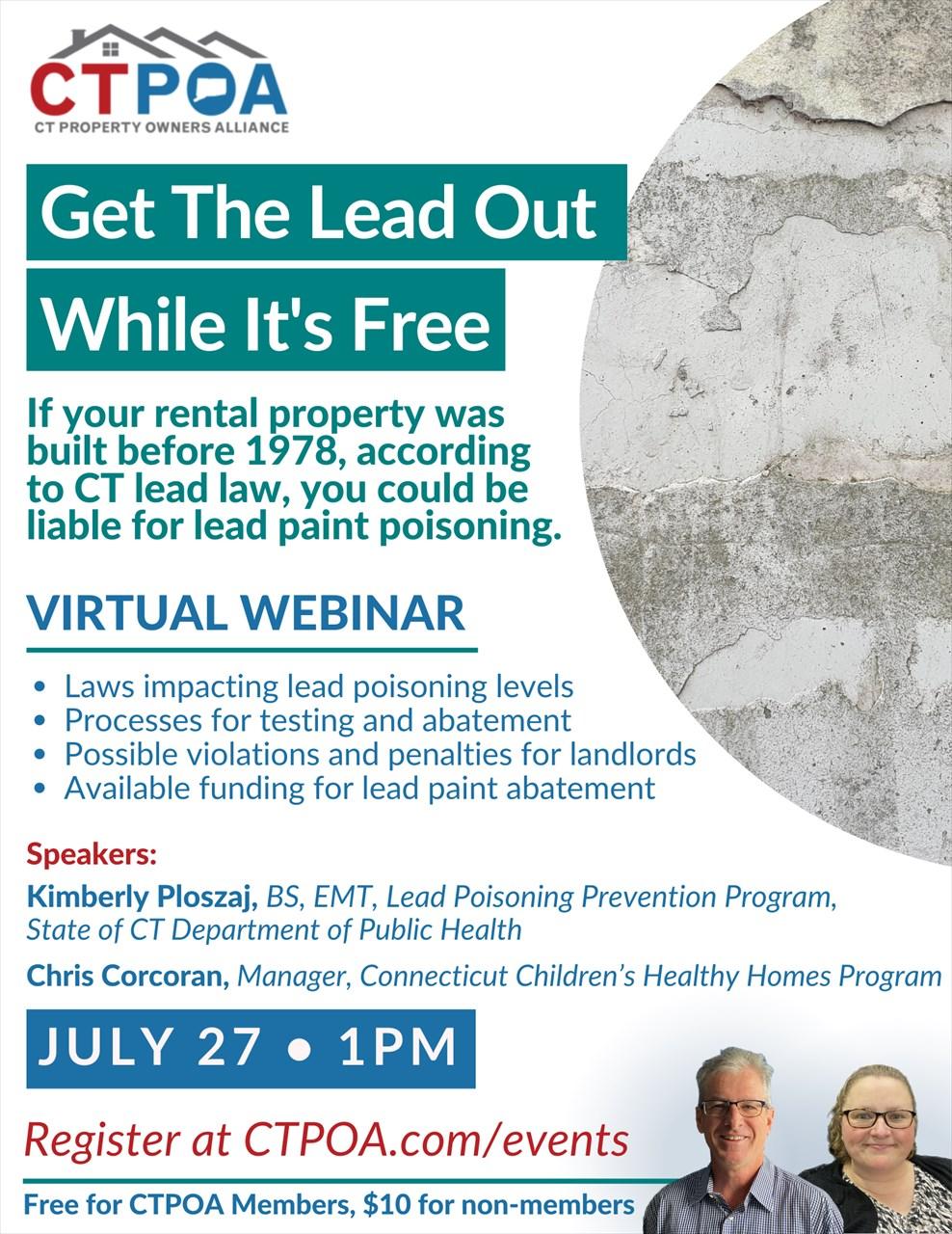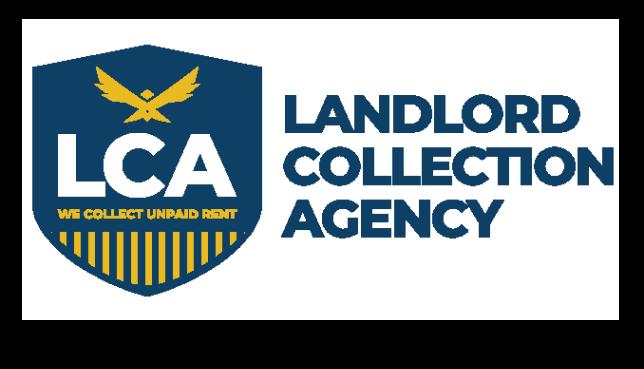In This Month’s Edition




Pg. 06 - Become a Fair Rent Commission Member: Empowering Landlords for a Balanced Rental Market
Pg. 18 - Lead Paint Regulations in Connecticut for Landlords

Pg. 10 - CT Homebuyers Still Out in Force, but Real Estate Listings Scarce Through First Half of 2023
Pg. 20 - Rent Control: What It Is and How It Works

Publisher’s Message
A Message From Bob DeCosmo, President Of CTPOA
News And Views From The Capitol
Become a Fair Rent Commission Member: Empowering Landlords for a Balanced Rental Market
Realtor Report
CT Homebuyers Still Out in Force, but Real Estate
Listings Scarce Through First Half of 2023




Insurance Insights
7 Steps to Finding the Right Homeowners Insurance
Policy and Mistakes to Avoid in the Process

Property Management Tips & Tricks
Lead Paint Regulations in Connecticut for Landlords






Advocate For Property Owner Rights
Hope everyone is enjoying their summer so far. It is sure nice to step back a bit after the hectic and difficult legislative session we just experienced. For those that haven’t been paying close attention to housing policy, it’s shifted firmly in the direction of favoring tenants and putting the viability of the rental housing industry in jeopardy.
Affordable housing which the vast majority is provided by mom-and-pop landlords wouldn’t survive the impact had the full socialist legislative agenda passed in Connecticut this session pushing for rent control, sealing eviction records, and eliminating lapse of time evictions; it would become a free for all for non-paying tenants to just play the game and screw our housing providers consistently.
While rent control was the big topic, a rather quiet environmental movement is underway to eliminate lead from housing units. It’s a difficult task to say the least as lead is an element on our planet and is found in the air, water, soil, and some household and food products.
In 2022, Connecticut passed a law that lowers the level where a child is lead poisoned and the property owner must abate their apartment. Abatement orders can run upwards of $30,000 or more depending on the scope of work needed.
The last statistics I was able to access were the 2020 numbers provided by the CT Dept. of Public Health and showing statewide the number of children having certain lead levels in their blood.

The good news is the number of cases of elevated lead has been decreasing on a steady basis. The bad news is that the number of abatement orders issues to property owners by local health departments will increase substantially over the next two years as Connecticut phases in a lower threshold to cite a landlord. In 2022, the lead level to issue an immediate abatement order was 20 micrograms per deciliter (ug/dl) in the child’s blood. In 2023, that level dropped to 15 ug/dl and is set to reduce to 10 ug/dl in January of 2024 and then go to 5 ug/dl in January of 2025.
We’re going from 42 cases statewide to 649 by simply lowering the threshold where a child is considered poisoned. Recently, there has been discussion to further lower the level to 3.5 ug/dl which would substantially increase the number of poisoned kids and create another wave of abatement orders for property owners to comply with.
In addition, the EPA is talking about a ZERO lead dust level for floor sampling, a condition that would be remarkably difficult to comply with as lead enriched soil borne dust is a leading cause of lead poisonings and once windows are opened, lead is being introduced into the dwelling unit.
Lead abatement orders are rather expensive to deal with and currently there are pools of funding available to remove lead from a property. Landlords should be lining up to take advantage of the available funding and be proactive, rather than reactive and deal with a potential costly abatement order soon.
On Thursday 7/27 at 1:00 PM CTPOA is hosting a webinar with two great speakers, Kim Ploszaj from the CT Department of Public Health and Chris Corcoran, manager of the Healthy Homes Program that provides some funding for lead abatement work.
If your property was built prior to 1978, I suggest you attend this webinar and learn more on this very serious topic, the link to the webinar is; https://ctpoa.com/events/
Become a Fair Rent Commission Member: Empowering Landlords for a Balanced Rental Market
By: CTPOAIn recent years, the demand for affordable housing has intensified, leading to significant changes in the rental market. To ensure fairness and equilibrium between tenants and landlords, many communities have established Fair Rent Commissions. Serving as a member of your local Fair Rent Commission can be a valuable opportunity for landlords to contribute to the community while safeguarding their interests. In this blog post, we will explore how to get appointed to your local Fair Rent Commission and the benefits that come with it as a landlord.
Understanding Fair Rent Commissions
Fair Rent Commissions are government bodies or committees established at the
local level to oversee rental policies, protect tenants' rights, and address issues related to rent control and fair housing practices. The primary goal is to strike a balance between providing affordable housing options for tenants and ensuring landlords can maintain a sustainable rental business.

Getting Appointed to Your Local Fair Rent Commission
1. Research and Familiarize Yourself: Start by researching your local Fair Rent Commission and familiarizing yourself with its mission, objectives, and policies. Understand the current rental landscape, prevailing issues, and the commission's role in resolving disputes.
2. Attend Public Meetings: Attend public
or hearings organized by the Fair Rent Commission. This will give you an opportunity to understand the commission's functioning, observe its members, and gain insights into their decision-making processes.
3. Engage with Local Community: Actively engage with the local community, including tenants, landlords, housing advocacy groups, and other stakeholders. Attend neighborhood meetings, interact with residents, and participate in discussions surrounding rental policies and affordability concerns.
4. Network with Relevant Parties: Connect with existing Fair Rent Commission members, local government officials, and influential community leaders. Seek their guidance and express your interest in becoming a member. Networking can open doors and enhance your chances of securing an appointment.
5. Volunteer or Serve on Advisory Boards: Get involved in related activities such as volunteering for housing organizations or serving on advisory boards that deal with housing issues. These experiences will showcase your commitment to the cause and demonstrate your suitability for a position on the Fair Rent Commission.
6. Submit Your Application: Once you have familiarized yourself with the commission's work, engaged with the community, and built a network, submit your application for consideration. Highlight your experience as a landlord, your knowledge of rental laws and regulations, and your commitment to maintaining a balanced rental market.
Benefits to Landlords
1. Influence Policy Decisions: By serving on the Fair Rent Commission, landlords have a direct say in shaping rental policies and regulations. Your expertise and experience as a landlord can bring a unique perspective to discussions, ensuring that the commission's decisions are well-rounded and consider the interests of both tenants and landlords.
2. Stay Informed: As a member of the Fair Rent Commission, you will be at the forefront of new developments, trends, and legal changes in the rental market. This knowledge can help you anticipate and adapt to market shifts, enabling you to make informed decisions regarding your rental properties.
3. Networking Opportunities: Serving on the Fair Rent Commission allows you to network with other landlords, community
community leaders, and housing professionals. Building these connections can provide valuable insights, create business opportunities, and foster collaborative relationships that benefit your rental business.

4. Mitigate Potential Conflicts: By participating in the decision-making process, landlords can proactively address concerns or disputes before they escalate. Being part of the Fair Rent Commission allows you to contribute to creating fair and transparent mechanisms for resolving conflicts between tenants and landlords, reducing the likelihood of legal disputes.
5. Enhance Your Reputation: Serving on the Fair Rent Commission demonstrates your commitment to promoting a balanced rental market and supporting affordable housing. This can enhance your reputation
as a responsible landlord, attracting quality tenants and potential investors who value ethical and fair business practices.
Becoming a member of your local Fair Rent Commission presents a unique opportunity for landlords to actively participate in shaping rental policies and fostering a balanced rental market. By getting involved, you can have a direct impact on decisions that affect both tenants and landlords while benefiting from the knowledge, networking opportunities, and improved reputation that come with this role. By working collaboratively with tenants and other stakeholders, you can contribute to creating a more equitable rental market that serves the needs of all parties involved.

CT Homebuyers Still Out in Force, but Real Estate Listings Scarce Through First Half of 2023
By: Alexander Soule, with ctinsider.comAs homebuyers beat the bushes in Connecticut, no towns have seen a more concentrated group of opportunistic sellers than New Canaan and Darien in the first six months of 2023 with many of those wealthier property owners able to buy new homes, undeterred by higher interest rates that are prompting others to sit tight to create an ongoing squeeze in the Connecticut real estate markets.
Connecticut saw unusually low numbers of houses and condominiums put up for sale in the first half of the year, helping constrict sales by 26 percent from a year earlier to about 21,950 units, according to preliminary data from Berkshire Hathaway HomeServices New England Properties.
But homes are selling at just as quick a pace as a year ago at four weeks on average statewide and less than two weeks in select
towns and prices remain elevated as wealthier buyers cherry-pick the best properties, and bidding skirmishes continue to break out on those deemed to carry the best values across price brackets.
The boom market sparked by the COVID-19 pandemic prompted many Connecticut homeowners to sell at prices they could not have gotten a year earlier, but higher interest rates have kept some sitting tight in the next wave of potential sellers, despite ample numbers of people looking to buy.
"In the middle of last June, there was a line in the sand that happened in activity and it was when the Fed started their aggressive raising of rates," said Amy Barsanti, a broker in the Darien office of William Pitt Sotheby's International Realty. "It was like 'boom' wind out of the sails, and we had a very sluggish back half of the year. So when you start

comparing the back half of '23 to the back half of '22, we're going to start to look much more positive."
Barsanti added that while many buyers have made the adjustment and are factoring in higher interest rates into their house purchase budget, potential sellers have been slower to follow suit, particularly in instances where they are paying down mortgages on their existing homes at far lower rates than what they would get for a mortgage on a new home for themselves.
"They're saying, 'I am not selling this house because ... whatever higher pricing I think I could get on selling this house is totally eroded on what I think I can now purchase,'" Barsanti said. "That is hugely contributing to why inventory is at these record lows."
New York City buyers
In the first week of July, mortgage rates hit their highest mark of the year as tracked by Freddie Mac, with the average rate for a 30year loan at 6.8 percent, up from 5.3 percent a year earlier. Rates peaked last November

just above 7 percent, their highest level since 2000.
"The impact of interest rates always have a lag," said Daniel Pinto, president of JPMorgan Chase, speaking last month at a Bernstein investment conference. "Credit conditions are tightening but loan demand is also coming down the biggest part of that is mortgages."
In its first-half report William Pitt Sotheby's notes that New York City buyers continue to prop up prices in the wider region as young families look to move to the suburbs, in contrast to much of the rest of the United States where prices have begun to ebb as tracked by the National Association of Realtors.
Connecticut's median home sold for $350,000 in the first half of 2023, up $15,000 from a year earlier for a 4.5 percent increase. Nearly 300 properties sold for that figure, from a fixer-upper antique on Main Street in Stonington with seven bedrooms, eight fireplaces and a view of the upper
reach of the Mystic River; to a cabin escape along Mudge Pond in Sharon near the northwestern juncture of the New York border.
Cromwell had the biggest increase in median prices among Connecticut towns and cities with at least 50 transactions in the first half, with the median home there selling for just under $300,000, a third higher from the median property in the first half of 2022.

If ranked according to new listings as a percentage of all housing units, Fairfield County remains the most active real estate market in Connecticut. In New Canaan, just over 400 homes were listed in the first half of the year, equal to 5.3 percent of the total housing stock as calculated by cross-indexing the Berkshire Hathaway listings data with U.S. Census Bureau estimates of housing units. Darien saw 4.7 percent of its housing stock put on the block, for about 340 houses and condos in all.
Weston was the only other Connecticut town to crack the 3 percent mark for new listings as a percentage of all housing units. Of the 20 towns

with the highest percentages of homes for sale, half were located in Fairfield County and three more in close proximity in Southbury, Beacon Falls and Roxbury.
Stamford continues to lead Connecticut for total home sales in 2023, with more than 530 transactions according to Berkshire Hathaway. But sales were down a third from a year earlier, a sharper drop than in the next six busiest real estate markets in Waterbury, Norwalk, Bridgeport, Hamden, Greenwich, Fairfield and West Hartford.



7 Steps to Finding the Right Homeowners Insurance Policy and Mistakes to Avoid in the Process
By: Alani Asis, with businessinsider.comYour home is probably the most expensive thing you own, so you want to have enough insurance to replace it in the worst-case scenario. Being underinsured, or signing with a company that can't pay claims, are mistakes you should avoid when shopping for homeowners insurance. However, many consumers overlook the importance of adequate coverage and quality customer service and instead focus on the lowest rates.
It is important to do your due diligence to find an insurer you trust and purchase coverage that fits your needs. By shopping around, you get the right coverage at a competitively priced premium. We'll take you step by step through what you need to know to do that.

Step 1: Figure out what you need covered
Start by determining the replacement cost of your home, the total value of your personal
belongings, and the total value of your assets. You also want to consider covering additional structures such as garages or sheds and purchasing flood or earthquake insurance if you live in a high-risk area.
Step 2: Calculate how much coverage you need
Calculate the replacement cost of your dwelling: Local construction cost and you're home's size are two of the most significant factors affecting your home's replacement cost, according to the Insurance Information Institute (III). Factors such as your home's exterior and interior construction materials or other special features on your property like garages or a pool will also determine how much coverage you'll need.
There are several ways to estimate your dwelling's replacement cost. You can either get
an estimate from your insurer or use a thirdparty replacement cost calculator. You can also hire an in-person appraiser, which may be more costly, or you can do it yourself by multiplying your local construction cost by the square footage of your home. Use multiple methods to get the most accurate replacement cost, which will ensure you're covered entirely.
• Perform a home inventory: Creating a detailed list of your possessions will help you assess how much you'll need in homeowners insurance. After recording your home's inventory, consider whether you'd like to insure your personal property for its actual value or replacement cost coverage. Take note of expensive items like jewelry or expensive electronics. If your inventory includes things that require more coverage, consider purchasing a personal property floater or endorsement.
• Figure out how much additional living expense insurance you'll need: Most policies cover you if you need to make alternative living arrangements while rebuilding your home after a claim. According to the III, the cost to pay for living expenses during repairs amounts to 20% of the home's replacement cost. Check with your insurer as additional living expense limits vary with each provider. You can increase this coverage at an extra charge.
Determine how much liability insurance
you'llneed: You should purchase enough liability insurance to cover your assets. Most homeowners insurance policies have a minimum of $100,000, but consider having at least $300,000 to $500,000 of coverage, says the III. If that's not enough to cover your assets, consider purchasing an umbrella or excess liability coverage.
Step 3: Have your personal information and your home's information
Having your personal and home's information on hand can help you expedite gathering home insurance quotes.
1. Personal information: Name, date of birth, marital status, and contact information
2. Basic information about your home: Address, how long you've lived in your there, what type of home you reside in and if it's your primary residence, if there's a mortgage on the property, the year it was built, square footage, number of bedrooms/ bathrooms, number of stories
3. How your home was built: Material your building, exterior wall, and roof are made out of, heating or cooling systems, and the type of foundation and construction your home has
4. Safety: How far your home is from the nearest fire station and fire hydrant, if you have home safety systems
5. If you need extra coverage: Jewelry and high-end electronics, pets, swimming pools, or
trampolines if you operate a business in your home
Step 4: Gather and compare home insurance quotes

The III recommends gathering quotes from at least three different companies. To begin your search, ask friends and relatives for recommendations. You can also contact your state insurance department to provide you with rates and complaint ratios of major insurers.
To compare quotes, know what's going into your policy's coverage to make the best applesto-apples comparison. A standard homeowners insurance will include dwelling, personal belongings, liability protection, and additional living expenses coverage. Ensure any additional coverage you opt to purchase is included in your quote.
You also want to check that your deductibles and coverage amounts are equal across all your quotes. A deductible is an amount you have to pay before your insurance provider
delivers your claim. The lower your deductible is, the higher your premiums will be. Additionally, it's necessary to ensure your coverage amounts are the same across the board. You don't want to end up underinsured if you need to rebuild your home, replace your personal property, or get sued for accidents that occur on your property.
Step 5 : Look into discounts you qualify for
While it is important not to overlook your coverage for a lower rate on your homeowners insurance premiums, there are still ways to reduce your costs. Here are some of the popular discounts homeowners insurance offer:
• Multi-policy discounts: Receive a discount for bundling your homeowners insurance policy with another insurance product, usually auto insurance.
• New home/new home buyer discounts: If you're a new home buyer or just purchased a newly constructed home, you may qualify for a
• discount. What qualifies as a "new home" varies among insurance companies.
• Automatic, pay-in-full, electronic funds transfer, paperless discount: Get a discount for choosing a payment type.
• Claims-free discount: Receive a discount for having a clean record with your homeowners insurance.
• Loyalty discount: Your provider may offer a discount for being insured with them for a consecutive number of years.
• Home safety discount: You may be eligible for a discount if you have devices like burglar alarms or smoke detectors installed.
• Smoke-free discount: Non-smokers can get a discount for having a smoke-free household.
• Home improvement discount: Get a discount for upgrading your roof, electrical, heating, and plumbing systems to improve the quality of your home.
Step 6: Research the trustworthiness of each company
To ensure you get the best value, research the trustworthiness of an insurance provider. An insurer's financial strength, rated by independent agencies, can help you determine if it can compensate you for a claim when you need it. AM Best assigns insurance companies letter grades from A+ to F. If a
company is rated anything below a B, it is not financially stable and cannot pay claims reliably.
You can also check a company's trustworthiness by looking at customer satisfaction. J.D. Power's home insurance customer satisfaction survey ranks major insurance companies based on a 1,000-point scale.
Step 7: Finalize and purchase your policy
Once you've selected the right policy for you, ensure all your information is correct before signing. Note that your insurance company may require a home inspection to make sure your application's replacement cost coverage and property information is accurate.
You also want to know how you will be paying your insurance premiums. You will usually pay your insurance premiums to your homeowners insurance provider or mortgage lender. You'll pay your premiums in full or in recurring payments through your homeowners insurance company. If you have a mortgage lender, you may have to pay premiums with your monthly mortgage payment through an escrow account.
Finally, you'll have to choose your policy's date. If you are purchasing a new policy, notify your mortgage lender.
Lead Paint Regulations in Connecticut for Landlords
By: CTPOALead paint is a serious health hazard, especially for young children. In Connecticut, landlords have a responsibility to take steps to protect their tenants from lead poisoning. This includes:
• Providing tenants with a lead hazard disclosure form at the beginning of the tenancy.

• Abating lead hazards in rental units where lead poisoning has been identified.
Abating Lead Paint
If lead poisoning has been identified in a rental unit, the landlord must abate the lead hazards in the unit. This means removing, covering, or sealing the lead paint. The landlord must hire a licensed lead abatement contractor to do the work.
Landlords
who fail to comply with lead paint regulations may be subject to fines and other penalties.
The landlord must also provide the tenant with a copy of the lead abatement plan. This plan must include information about the methods that will be used to abate the lead hazards, the safety precautions that will be taken, and the schedule for completion of the work.
The Connecticut Department of Public Health (DPH) is responsible for enforcing lead paint regulations. If the DPH finds that a landlord has violated the regulations, they may issue a violation notice. The landlord may be required to take corrective action, such as testing for lead paint, providing a lead hazard disclosure form, or abating lead hazards.
Landlords who fail to comply with a violation notice may be subject to fines. In some cases, the DPH may also file a lawsuit against the landlord.

CTPOA will host a very important webinar July 27th, 2023 on lead paint and changing laws affecting lead paint levels in Connecticut. This webinar is free to CTPOA members. Register HERE today to stay in-theknow!
Lead paint is a serious health hazard, and landlords have a responsibility to protect their tenants from lead poisoning. By providing a lead hazard disclosure form, and abating lead hazards, landlords can help to keep their tenants safe and themselves in compliance with the law.
For more information on lead paint regulations in Connecticut, please visit the DPH website: https:// portal.ct.gov/DPH/EnvironmentalHealth/Lead-Poisoning-Preventionand-Control

Rent Control: What It Is and How It Works
By: CTPOARent control is a government policy that limits how much landlords can charge tenants for rent. The goal of rent control is to make housing more affordable for tenants, especially those who are lowincome or have fixed incomes.
There are two main types of rent control:
• Maximum rent control: This type of rent control sets a maximum rent that landlords can charge for a unit. The maximum rent is usually based on the unit's size and location.
• Percentage rent control: This type of rent control limits how much landlords can raise the rent each year. The amount of the rent increase is usually based on a percentage of the previous

year's rent.
Rent control is a controversial policy. Some people believe that it is necessary to protect tenants from high rents and to ensure that everyone has access to affordable housing. Others believe that rent control discourages investment in rental housing and leads to a shortage of rental units.
The Pros and Cons of Rent Control
Pros of Rent Control
• Rent control can make housing more affordable for tenants, especially those who are low-income or have fixed incomes.
Pros of Rent Control
• Rent control can prevent sudden rent increases.
• Rent control can give tenants more security and peace of mind.
lower rent payments and more security in their housing.
Cons of Rent Control
• Rent control can discourage investment in rental housing.
• Rent control can lead to a shortage of rental units.
• Rent control can make it difficult for landlords to make necessary repairs and improvements to rental units.
• Rent control can lower property values and shift tax burdens from investment property onto single family homes
The impact of rent control on landlords and tenants can vary depending on the specific rent control policy in place. For example, maximum rent control can have a more significant impact on landlords than percentage rent control.
The Future of Rent Control
The future of rent control is uncertain. Some cities and states are considering expanding rent control, while others are considering repealing or scaling back existing rent control policies. The impact of rent control on the housing market and the economy is also a topic of debate as witnessed here this year at our Connecticut State Capitol.
The Impact of Rent Control on Landlords and Tenants
Rent control can have a significant impact on landlords and tenants. For landlords, rent control can mean lower rental income and less incentive to invest in upgrading their rental properties or purchase more property. For tenants, rent control can mean
Looking for some more thoughtful insight into rent control from the perspective of landlords? Check out this free webinar on YouTube, hosted by SPOA (Small Property Owners Alliance of Massachusetts), breaking down the pitfalls of rent control.

5 Ways to Keep Your Home Comfortable in a Humid Climate

By: energy.gov
Home energy efficiency is often dominated by discussions about cooling and heating, which account for about 48% of energy costs in the average home. However, when your air has too much moisture, your home may feel warmer than the actual air temperature. Any discussion of energy efficiency, especially in a humid climate, must take moisture control into account.
Did you ever hear someone say the air in your house feels “close?” They’re likely talking about the “feels-like” temperature of the air because the indoor environment is holding a high amount of water vapor, and there’s less evaporation. These factors combine to create a sensation that the room is too warm and there’s less breathable air, despite the temperature reading on the thermostat.
A house with too much humid air in the “building envelope” can have issues with mold and mildew. Moist air can also provide a good environment for bacteria. All are known to adversely affect human health. Excess moisture in the air can take a toll on people, and on furniture, appliances, hardwood floors, carpeting, and, yes, the energy bill chances are, you are setting your thermostat lower to maintain comfort as you offset the higher amount of humidity you feel in the air.
One solution to moisture control could be a whole-house or portable ENERGY STARrated dehumidifier that “wrings” moisture from the air. This is a big commitment that might not be right for everyone. Luckily there are other steps you can take to reduce the amount of moisture in your
home.
Check your clothes dryer. An improperly vented clothes dryer can dump some or all that water from your wet clothes into the air. Make sure your venting system is sealed all the way from the back of your dryer to the exhaust port on your home’s exterior. And be sure to clean the vent regularly, according to the manufacturer’s recommendations.
Vent your stove and bathroom fans outside. Exhaust fans from cooking surfaces or the bathroom that are vented into your attic only redistribute humidity within your home. All such fans should be vented to the outside, with the system checked for leakage.

Seal air leaks. Finding the places where outside air is leaking in, and conditioned air is leaking out, and sealing those leaks is a cost-effective way to improve air comfort and cut energy costs. Check your doors and windows for the effectiveness of air seals and caulk or weatherstrip as needed.
Insulate water pipes. Condensation can occur when there is a difference between the temperature of your water pipes and the humid air in your home. Insulating your
water pipes keeps this condensation from occurring on the cold water pipes. This condensation contributes to humidity problems in the home. Insulating hot water pipes eliminates heat loss between the hot water heater and the tap, which means heating and using less water over time. Both will help keep your energy bill in line.
Monitor drainage around your home. Rainwater and runoff from gutters and downspouts can easily flow toward your foundation and leak or leech into the structure. Directing the water away with landscaping and sealing your foundation can have a big impact on the humidity level in your home, and your energy bill.
We all know the saying, “it’s not the heat, it’s the humidity.” Well, now you know a few new ways to keep the air in your home a little drier, and hopefully a bit more comfortable.
Top Ten Tips for Landlords
By: Beth Dillman, with nolo.comSimple suggestions to help your landlord or property management business run smoothly.
As a landlord, it can be difficult to manage all the different aspects of renting an apartment or a house. Here are the top ten things you can do to ensure your relationships with tenants remain on good terms.
1. Screen tenants.
Don't rent to anyone before checking credit history, references, and background. Haphazard screening and tenant selection too often result in problems, such as a tenant who pays the rent late or not at all, trashes your place, or lets undesirable friends move in. Use a written rental application to properly screen your tenants.
2. Get it in writing.
Be sure to use a written lease or month-tomonth rental agreement to document the
important facts of your relationship with your tenants including the basics about rent payment and tenant responsibilities, as well as when and how you handle tenant complaints and repair problems, how much notice you must give to enter a tenant's apartment, and so forth.
3. Handle security deposits properly.
Establish a fair system of setting, collecting, holding, and returning the amounts tenants pay up front as a security deposit. Inspect and document the condition of the rental unit before the tenant moves in, to avoid disputes over security deposits when the tenant moves out. Check our your state's law to ensure you are handling security deposits correctly.

4. Make necessary repairs.
Stay on top of maintenance and repair needs and make repairs when requested. If the
property is not kept in good repair, you'll alienate good tenants, and they may be legally entitled to the withhold rent, repair the problem and deduct the cost from the rent, sue for injuries caused by defective conditions, and/or move out without giving notice.
5. Provide secure premises.
Don't let your tenants and property become easy marks for a criminal. Assess your property's security and take reasonable steps to protect it. Often the best measures, such as proper lights and trimmed landscaping, are not terribly expensive.
6. Provide notice before entering a unit.
Learn about your tenants' rights to privacy; see Repairs, Maintenance, and Entry to Rented Premises. Notify your tenants whenever you plan to enter their rental unit, and provide as much notice as possible, at least 24 hours or the minimum amount required by state law.
7. Disclose environmental hazards.
If there's a hazard such as lead or mold on the property, tell your tenants, either before they move in or as soon as you become aware of the problem. Landlords are increasingly being held liable for tenant health problems resulting from exposure to environmental toxins in the rental premises. Check your state law for other landlord disclosures.
8. Oversee property managers.
Choose and supervise your property manager carefully. If a manager commits a crime or is incompetent, you may be held financially responsible. Do a thorough background check and clearly spell out the manager's duties so as to help prevent problems down the road.
9. Obtain insurance.
Purchase enough liability and other property insurance. A well-designed insurance program can protect you from lawsuits by tenants for injuries or discrimination and from losses to your rental property caused by everything from fire and storms to burglary and vandalism.
10. Resolve disputes.
Try to resolve disputes with your tenants without lawyers and lawsuits. If you have a conflict with a tenant over rent, deposits, repairs, your access to the rental unit, noise, or some other issue that doesn't immediately warrant an eviction, meet with the tenant to see if the problem can be resolved informally.
If that doesn't work, consider mediation by a neutral third party, often available at little or no cost from a publicly funded program. If your dispute involves money, and all attempts to reach agreement fail, try small claims court, where you can represent yourself. Small claims court is good for collecting unpaid rent or seeking money for property damage after a tenant moves out and the security deposit is exhausted.
We have built a strong reputation as an outstanding mortgage brokerage firm, serving the lending needs of real estate professionals, individual homebuyers and current homeowners throughout the state.
We're a full service mortgage broker with an experienced staff offering expertise in every area of mortgage lending. We have access to a full range of mortgage sources and all of our lending specialists are dedicated to finding the right loan-with the best rates, terms and costs-to meet your unique needs. But that's just the beginning of our service. Throughout the lending process, we provide regular loan updates and progress reports so you always know the status of your loan.
We provide local customized service and have access to some of the lowest rates and fees in the marketplace while providing transparency, exceptional client support, and a streamlined closing process.
Thank you for visiting New England Residential Finance, LLC. We look forward to putting our mortgage service to work for you!

Contact us: 203-441-4716
Apply NOW for a Better Mortgage Experience

MICHAEL ROUSSEAU
NMLS ID #36474
Michael has been in the mortgage lending business for more than 20 years, he is an experienced loan professional that is dedicated to providing honest and straightforward guidance to those looking to purchase, renovate or refinance their home. Michael has worked in many areas of the mortgage business and has an expansive knowledge of the loan process from application to closing.
Michael is the owner of New England Residential Finance, LLC located in Wolcott, CT where he manages the daily operations of the business, assists clients through the entire loan process as well as lead a successful sales team of mortgage originators.


NICHOLAS MINICUCCI
NMLS ID #741584

With more than 20 years in the mortgage industry, Nick has a extensive knowledge of all aspects of the mortgage business. Before joining New England Residential Finance, LLC (NERF, LLC) in 2015 as a Mortgage Processor, I was a Mortgage Loan Originator for Webster Bank for 13 years. I then became a licensed Senior Mortgage Loan Officer for NERF, LLC in November 2016. I am knowledgeable in both conventional and government lending and I am committed to helping all clients achieve the dream of home ownership or refinancing their current home.
When I am not working which isn't often, I am a proud father of 2 boys. I spend my free time I have raising my two sons. I have a 20 year old son who is currently in college at Johnson & Wales in Rhode Island studying to become an anesthesiologist. My youngest son, who is 10 years old is in 5th grade. He keeps me busy with doing anything outside sports related and when not outside we are usually off to arcades, trampoline parks or playing video games.
When to Involve a Tenant Rent Collection Agency Versus Small Claims Court
By: CTPOAAs a landlord, it can be frustrating when a tenant doesn't pay rent. You may be wondering if you should hire a collection agency or file a claim in small claims court.
Here are some factors to consider when making this decision:
• The amount of unpaid rent: If the amount of unpaid rent is relatively small, you may be able to collect it yourself. However, if the amount is large, it may be worth hiring a collection agency.

• The tenant's financial situation: If the tenant is unemployed or has other financial difficulties, they may not be able to pay the rent even if they want
to. In this case, hiring a collection agency may not be the best option.
• Your time and resources: If you don't have the time or resources to deal with the collection process, hiring a collection agency may be the best option. Collection agencies typically charge a fee, but they can often collect more money than you could on your own.
• Your state's laws: Some states have laws that favor tenants in the court process. If you live in one of these states, it may not be productive if you file a claim in small claims court as certain exemptions exist to protect debtors.
It’s important to note that you can do BOTH. Sometimes, both routes are a good plan of attack.
If you decide to hire a collection agency, be sure to choose one that has a good reputation and that specializes in collecting unpaid rent. You should also get everything in writing, including the agency's fees and their policies on collecting and reporting delinquent rent.
If you decide to file a claim in small claims court, be sure to follow the specific procedures in your state. You may also want to consult with an attorney to make sure you understand your rights and options.
The good news about using a collection agency like LandlordCollections.net is that even if no money is successfully recovered, this company will report the money owed to the Credit Bureau and will impact the tenants credit report for up to 7 years. Their poor rental payment performance will also show on TenantTracks screening reports for 7 years, as these two companies are
closely affiliated. What’s even more convenient is it’s only $19.99 to file a report on LandlordCollections.net, so it’s a no-brainer to regain control and help warn other housing providers about your difficult tenant.

LandlordCollections.net is a collection agency that specializes in collecting unpaid rent from tenants. They have a team of experienced collectors who are familiar with the laws and regulations that apply to tenant debt.
Ultimately, the best way to collect unpaid rent will depend on your specific situation. If you're not sure what to do, it's a good idea to consult with an attorney.



































